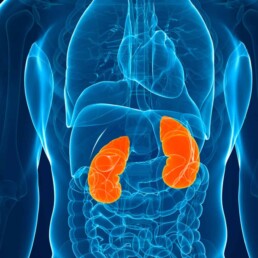In recent years, there has been growing interest in understanding the relationship between diet and kidney health, particularly the role of organic food. This blog explores the question: Is organic food better for kidney health? We delve into the definitions, nutritional aspects, and research findings to provide a comprehensive view.
By Majd Isreb, MD, FACP, FASN, IFMCP
What is organic food? Understanding standards and certifications
Organic food, as defined by the U.S. Department of Agriculture (USDA), adheres to stringent farming and processing standards focused on natural methods and environmental sustainability. For crops, this includes using land free from synthetic fertilizers and pesticides for at least three years, employing natural soil fertilization and pest control methods, and avoiding genetic modification.
In the case of livestock, organic standards require outdoor access for animals and organic feed and restrict the use of antibiotics and growth hormones. The processing of organic foods prohibits artificial preservatives, colors, or flavors and avoids irradiation and industrial solvents.
The certification process for organic food involves rigorous checks by USDA-accredited agents, ensuring adherence to organic regulations and annual inspections. Products entirely composed of organic ingredients can be labeled ‘100% organic,’ while multi-ingredient products require at least 95% organic content to use the USDA organic seal. These standards aim to promote ecological balance, conserve biodiversity, and contribute to the overall quality and safety of food consumption.
Join us to end the kidney disease epidemic
Impact of pesticides in conventional foods on kidney health
Pesticides and herbicides used in conventional farming are a growing concern for public health, particularly regarding their potential impact on kidney health. These chemicals, designed to protect crops from pests and diseases, can leave residues in food products.
When consumed, these residues can accumulate in the body over time. Research has shown that certain pesticides can have nephrotoxic effects, meaning they can damage or impair the function of the kidneys. This is particularly concerning because the kidneys’ primary function is to filter and eliminate toxins from the body. Prolonged exposure to certain pesticides has been associated with chronic kidney disease, especially in agricultural communities where direct exposure is more common.
Analysis of the National Health and Nutrition Examination Survey (NHANES) data in the United States showed that people who are exposed to pesticide malathion are at a higher risk of developing serious kidney disease.
The benefits of choosing organic foods, which have lower pesticide residues, become particularly relevant in this context. Organic farming standards prohibit or strictly limit the use of synthetic pesticides, leading to significantly lower levels of these chemicals in organic produce compared to conventionally grown foods.
For individuals with existing kidney issues or those at risk, reducing exposure to these potential toxins by consuming organic foods could be beneficial. These individuals may suffer from increased concentrations of pesticides related to accumulation from decreased clearance by the kidneys.
While more research is needed to fully understand the long-term impacts of pesticide residues on kidney health, the current evidence suggests that minimizing exposure through organic food choices is a prudent step for those concerned about their kidney health.
Nutritional benefits of organic food in kidney health
Organic foods are often touted for their higher nutritional content, which can have significant implications for kidney health. Studies have shown that organic produce can contain higher levels of certain nutrients, antioxidants, and omega-3 fatty acids.
Antioxidants, for instance, play a crucial role in reducing oxidative stress in the body, a condition that can exacerbate kidney damage, particularly in chronic kidney disease (CKD) patients. Oxidative stress is a known contributor to the progression of kidney diseases and related complications. Therefore, the higher antioxidant levels found in organic fruits and vegetables might help in mitigating these risks.
Another vital nutrient found in higher quantities in organic food is omega-3 fatty acids, particularly in organic meats and dairy products. Omega-3s are beneficial for heart health, and emerging research suggests they can also play a role in kidney health. They are known to have anti-inflammatory properties, which can be beneficial in reducing the risk of kidney diseases and slowing their progression.
For people with kidney issues, inflammation is a key concern, and managing it through dietary choices can be a practical approach. Additionally, organic foods are less likely to contain harmful pesticides and chemicals that could accumulate in the body and potentially harm the kidneys.
Heavy metals in conventional vs. organic foods
Organic foods might have a more favorable balance of certain minerals important for kidney health. For example, they may have lower levels of harmful heavy metals like cadmium, which is detrimental to kidney health. Cadmium can accumulate in the kidneys and potentially lead to kidney damage over time. Organic farming practices, which prohibit the use of synthetic fertilizers, might contribute to lower cadmium levels in organic produce.
Dietary Recommendations: Balancing Organic Food and Kidney Health
The decision to choose organic foods also depends on other factors, including cost and availability. Organic foods often come with a higher price tag, which can be a barrier for many people. A practical approach for those unable to switch entirely to organic is to focus on avoiding the “dirty dozen” – a list of fruits and vegetables known to have higher pesticide residues.
The bottom line
While organic foods offer certain nutritional benefits and lower pesticide and heavy metal exposure, the direct impact on kidney health is not clearly defined in the conventional peer-reviewed literature. It’s important for individuals, especially those with kidney issues, to consider all aspects, including nutritional content, potential contaminants, cost, and personal health goals, when making dietary choices.








